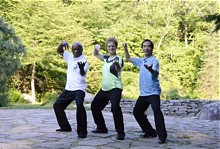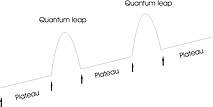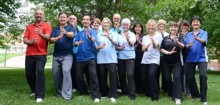More Ways to Improve Tai Chi
|
© Copyright Tai Chi Productions 2007. All rights reserved, no part of this article may be reproduced in any forms or by any means, without permission in writing, except for non-profit educational purpose. For example: you can photocopy this article for a paying student or participant as long as this article is not included as part of your charge. We've made it clear that to improve your tai chi you must understand the tai chi principles and practise regularly and with awareness. Now let's look at some other methods that will help you improve your skills. Some of these will work more effectively for some learners than for others, but they should help most people. Getting beyond the Plateau Phase In his book Mastery, George Leonard, a well-known Californian martial art expert, describes the "plateau phase". He explains that learners go through phases. In between each quantum leap of technical advance, there's a long plateau phase where improvement is slow and not obvious. This phase is necessary for absorbing knowledge and skill before rapid advancement can happen.
A typical learning curve therefore looks like the figure on the right:
Steep rises are separated by wide plateaus. Impatient students become bored and disappointed during the plateau phases and often drop out. In tai chi, plateaus and steep rises are yin and yang. The former is storing energy and the latter is delivery of energy. You need to store energy before you can deliver it. Like tai chi, this is nature. In the long run, being aware of and learning how to enjoy the plateaus will help you persist and make progress. Learning about flow can help you enjoy the plateau phase more.
Getting your flow going
Flow occurs when a person is so absorbed or so fully engaged in an activity that he or she becomes "lost in time". It often happens when an athlete performs at his or her best, or when an artist paints a masterpiece. Athletes sometimes call it "being in the zone". Whether you are doing a job, hobby or sport -or tai chi- if you are fully engaged, you are more likely to be "in flow".
After years of studying many thousand of people, Professor Mihaly Csikszentmihalyi, a professor of psychology and education at the University of Chicago and the author of Finding Flow, has found a close connection between enjoyment and flow. People whose lives are fulfilled and serene are more often in flow. He also found that it is possible to increase flow, and these findings are well supported by other experts.
Knowing that more flow leads to more enjoyment and fulfilment in life, you can work to increase your flow. If you can enjoy what you're doing, you know you will do better. More flow also means better tai chi.
Three main factors can induce flow: Goal in this case means a short-term goal. For example, your goal for one round of practice could be to move smoothly or simply to remember the movement. You'll know right away if you have remembered your movements correctly and if they're smooth. In other words, you will get immediate and relevant feedback. Matching your goals to your skill level will result in greater satisfaction. For example, if you're a newcomer to tai chi and unfamiliar with the moves, trying to do them smoothly could be too stressful. On the other hand, if you're experienced in tai chi, you may already be doing your moves smoothly, so this goal may offer no challenge at all. In other words, if the skill required to attain a goal is beyond your capacity, you are likely to get stressed and flow is unlikely to come; and if a goal is too easily achieved you will get bored and are unlikely to experience flow. Work to maximize these factors and you will have more flow. In tai chi, we aim to integrate body and mind, which can take you to a mental state similar to flow. As your tai chi improves, you'll be in flow more often. More flow will bring you more enjoyment, more enjoyment will drive you to practise more, and more practise will result in more flow.
Feeling good naturally
The human body resonates with nature and tai chi follows the rhythms of nature, so it should make you feel in tune with nature and feel good. Try to work towards nature's flow and rhythm in your practice.

Learning new skills
Learning something new often stimulates people to try harder. We've observed that with students who travel around the world to our annual one-week tai chi workshops. At the end of the workshops, they demonstrate what they've learned. The sparkle in their eyes from these demonstrations indicates their pride and pleasure. So whether you're learning a new set of forms or improving your forms, you're learning a new skill. Recognize and feel the excitement of that.
Helping people
Many tai chi practitioners around the world teach tai chi. Why? Most do it for the enjoyment they get out of helping people improve their health and quality of lives. Helping others is a powerful motivator, a part of human nature, so try to teach whenever you can. Teaching is also one of the best ways to improve your own skills.
Getting the habit
Humans are people of habit. That makes it easy to follow a routine of regular practice. Set a regular time daily for practice. And once you get into that habit, you'll find that your mind and your body will demand it. Many scientific studies have shown the health benefits of tai chi. Numerous people have made significant improvements in their health and quality of their lives. And the point is, they've done it themselves. They've taken control of improving their own life situations. The health benefits, and the pride they feel, drive people to improve their tai chi.
Using mind power
Tai chi is an internal art, which means that you have to use your thinking ability. And this is a big part of what makes tai chi so interesting. Keep using your mind when you are practising. Analyze your moves. What is the intrinsic purpose of the move? Does it make good sense? Does it feel comfortable? Does it feel balanced? Is it consistent with tai chi principles? Does it give you a stronger feeling of qi? Is it safe? Be aware of focusing your mind. Analyzing your own tai chi is the best way to gain deeper understanding and make improvements.
Using your mind also means allowing your mind to be open. If you're fixed on one idea and close your mind to others, then your mind is like a full cup: it can't take in anything else. On the other hand, an empty mind is like an empty cup, it is ready to take in or absorb new knowledge, and only then will you progress.
Absorbing
You must digest your food to make it useful to your body. You also have to digest tai chi until it gets inside your body, into your bones, and becomes a part of you. When you learn a new technique or form, you should try to practise it until you completely digest it. Only after digestion can you expand the skill.
Using self-guided imagery
The unconscious mind has strong control over us. To improve your tai chi, try using self-guided imagery, an excellent technique to train your unconscious mind. For further information, see chapter 12 Teaching Tai Chi Effectively by Dr Paul Lam. Letting go
This was summed up perfectly in an inspiring talk by Sheila Rae, a tai chi and qigong teacher: "There comes a point in our practice where we must learn to let go of the form, the perfectionism, and of the ego." Letting go and allowing nature to take effect is vitally important. Read Sheila's article on chapter 12 Teaching Tai Chi Effectively by Dr Paul Lam.
Related Articles:
back to the top
|




